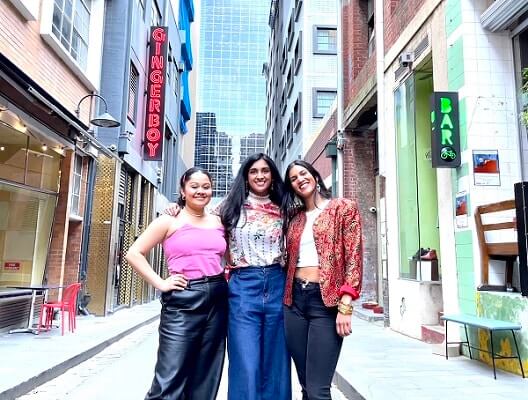The ground-breaking triple Olivier Award-winning stage show Emilia will make its Australian debut at Arts Centre Melbourne from 10 – 27 November, delivering a riotous, witty reclaiming of the life of an exceptional woman.
It is inspired by 17th century poet and revolutionist Emilia Bassano, England’s first published female poet, and Shakespeare’s contemporary. Emilia was a writer, wife, lover, mother, and muse. She was a woman at a time when women were banned from the stage. She was dark-skinned, the daughter of Italian/Moroccan parents and of Jewish heritage, at a time when Jews were banned from England. All she wanted was her voice to be heard.
And yet, while there are suggestions that she could have been the ‘Dark Lady’ of Shakespeare’s sonnets, her story and her poems remain all but airbrushed from history.
“It’s Hamilton meets Shakespeare!” laughs Sonya Suares, actor and co-producer of the play, describing it as “a fierce feminine trailblazer.”.
Over 400 years later, women are still faced with sexism, inequality and harassment. In recent times where the #MeToo movement and Roe vs Wade have been most prevalent, it seems that we are not evolving fast enough. This theatre piece shows that we are Emilia, that we must stand up alongside her and be counted.
Written by British playwright Morgan Lloyd Malcolm, the Australian version of Emilia features a team entirely made up of women and non-binary creatives from diverse cultural backgrounds as they unite to celebrate women’s voices through the story of this trailblazing forgotten woman.
And so Sonya Suares becomes one of three amazing South Asian actors in this play, the other two being Manali Datar and Sarah Fitzgerald.
Manali Datar plays young Emilia, from her childhood to her introduction to the English court along with the beginning of her journey as a writer, going through the trials and tribulations of being a woman at that time.
Sonya plays Lady Katherine, a character that Emilia meets at court.
Sarah Fitzgerald plays Lady Helena who Emilia also meets at court, as well as another character Eve, an illiterate washerwoman that Emilia takes under her wing.
“It’s an extremely funny play. However, one with urgent themes. For instance, my character has an arc that includes domestic violence, even though she is a Lady of the English court,” Sonya describes. “There are some pretty heavy themes that transcend culture, class, geographical borders. So often, violence against women is often assumed to be based on class, however, through the play, it’s evident that this is a fallacy.”
Eve, played by Sarah, also faces similar violence.
“The oppression, violence and struggle these women went through is real,” Sarah offers.
Manali chimes in, “These aspects of womanhood – such as motherhood, arranged marriages, domestic violence that cuts across social class – were very new and foreign to me.”
However, their characters find the voice, the strength, and joy.
Sarah notes, “There’s much hilarity in the play as well – with many of the characters poking fun at the authoritative figures.”
South Asians taking the stage

To see three actors of Indian origin in lead roles shows the manner in which the industry is changing today.
Sonya agrees. “This is my third decade in the industry, having started at 16. Forging the way for other actors of colour to come through, it is amazing to see that Sarah and Manali are able to be seen for lead roles in big plays after graduating. This was unheard of when I started. There was no space for people that looked like me. Getting recurring side roles was thought of as amazing. Getting a lead role in a play was hardly heard of – you just couldn’t get an audition for them. So my path has been about creating that space, organising festivals, and producing plays. Being one of the co-producers of Emilia is part of that ongoing process of making change and leading in terms of the work that is presented to audiences.”
For Sarah, the racial ambiguity is also a challenge, such as the lack of understanding that India is made up of a myriad of ethnicities. “We are more than just yoga and chai. I love walking into a room and owning my voice as an Indian person as I understand myself and heritage.”
Manali has seen considerable success in recent years (Harry Potter, Fangirls) and while she can credit her indisputable talent, she is probably aware that the industry into which she started is more accepting and inclusive than it was only ten years ago.
In fact, that is how she advises other hopefuls. “Be curious of the industry and projects.”
Sarah, for her part, suggests, “Feel strong in yourself. Surround yourself with a good support system of people, including those outside the industry whose only interest is your wellbeing.”
Sonya finishes with wise words. “Remember it’s not a sprint, it’s a marathon. Practice compassion not just for others but also for yourself. The beauty in our culture and the indigenous Australian culture is our respect for elders. The people who have forged the path ahead – pause and listen to them.”
Sounds like all three have what it takes to be in a play like Emilia – a rollicking ride that takes its audience on an exuberant and moving journey though love, loss, identity, ambition, power, rebellion and what it is to be a woman in a man’s world – or POC in a pretty pale industry.
READ ALSO: ‘Becoming the earth’ at the Bindi Bosses’ movement workshop





